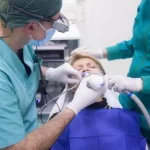Dental assistants perform both clinical and nonclinical duties. For instance, they might sanitize equipment, take and process dental x-rays or provide patients with oral hygiene instructions. Furthermore, dental assistants record treatment information while helping dentists manage medical or dental emergencies that arise.
People interested in this career must possess excellent interpersonal skills. They should be able to effectively communicate with patients when explaining procedures.
Training
Dental assistant programs generally last between six months and two years and many schools provide financial aid in the form of grants and scholarships that do not need repayment, student loans or even career placement services for graduates.
Dental assistant training entails classroom lecture, laboratory hands-on work and clinical supervised experience. Courses cover administrative duties such as scheduling appointments and maintaining patient files; infection control procedures; dental radiography techniques and more. Furthermore, this coursework prepares you for national certification exams.
As a dental assistant, to be successful you need strong interpersonal skills. Patients may be anxious or in pain, so having patience and caring demeanor are vital qualities. You should also adhere to strict infection control protocols while having exceptional manual dexterity – in addition to excellent attention to detail and understanding how to communicate with doctors and hygienists. Earning your degree in dental assisting will give you additional tools needed for working alongside medical professionals.
Job duties
Dental assistants perform an array of duties. From welcoming and assisting patients during exams and procedures, to providing information about oral hygiene and providing advice about it. In addition, they may help prepare x-rays or other diagnostic tools as needed, and record treatment information in patient records while helping dentists handle medical and dental emergencies.
Becoming a dental assistant requires at least a high school diploma or its equivalent; usually a certificate or associate degree from an accredited dental assisting program is preferred. Qualifications also include CPR and first aid certification and having obtained their state-required dental assistant license. Other essential qualities for being an effective assistant include knowledge of clerical duties, infection control techniques, dental equipment/materials as well as oral/written communication skills as well as fabricating custom trays/impressions as well as being familiar with various dental treatments such as whitening/fillings/crowns etc.
Education requirements
Dental assistants in most states must complete and pass a specific program of study and exam to become certified. Such courses usually last one or less year and are offered through vocational schools, community colleges, or private institutions. Such courses usually cover topics like dental anatomy, infection control and radiography while some even include hands-on clinical experience in an established clinic.
Many states also establish special licensing requirements for performing certain functions such as X-rays and coronal polishing; only dental assistants with valid licenses are authorized to carry out such tasks under direct supervision from licensed dentists.
Many states also require dental assistants to become CPR certified; training for this certification may be integrated into programs of study or available separately. Some programs also offer career interview preparation which may help students land the position they desire. After receiving training and certifications necessary to become dental assistants, the final step will be finding work as one.
Salary
The average dental assistant salary varies based on several factors, including practice location and size; larger city practices generally pay more than smaller rural practices, while salaries also depend on hours worked; emergency dental offices tend to offer higher hourly rates than regular offices.
Whoever desires a higher wage can increase their earnings by attaining additional certifications or experience in one of several specialties of dentistry such as orthodontic or oral surgery assisting. By increasing their value to their practice and asking for higher pay, this could allow for further increases.
One way to increase your salary as a dental assistant is through becoming certified in infection control and receiving additional training as a dental hygienist. Others choose to pursue their education further and become dentists themselves, which may bring increased salaries but requires both time and monetary investment.







 Understanding Skin Types – Normal, Dry, Oily, Combination
Understanding Skin Types – Normal, Dry, Oily, Combination  The Ultimate Skincare Routine for Every Skin Type
The Ultimate Skincare Routine for Every Skin Type  The Essential Guide to Digestive Enzymes Australia: Boost Your Gut Health
The Essential Guide to Digestive Enzymes Australia: Boost Your Gut Health  Latest Breakthroughs in Acne Treatment
Latest Breakthroughs in Acne Treatment  The Rise of Virtual Fitness Classes
The Rise of Virtual Fitness Classes  Fun and Creative Ways to Stay Active Indoors
Fun and Creative Ways to Stay Active Indoors  Linking Oral Health to Overall Wellbeing
Linking Oral Health to Overall Wellbeing  Can You Exercise While Pregnant?
Can You Exercise While Pregnant?  Is Skin Cancer Curable?
Is Skin Cancer Curable? 